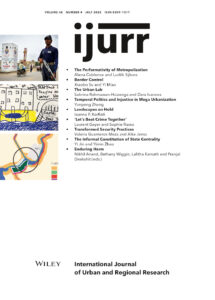Mumbai’s informal settlements have a long history of being denied formal access to water. While previous research has shown how settlers barely manage to survive by extracting water in the blurred spaces between formal and informal provision and through complex socio-material relationships, here we narrate a story of the local struggle to claim formal access to municipal water connections using a fundamental human rights approach. By critically looking at the historical practices of the state in setting obscure standards that denied access to municipal water, we show how the local grassroots movement and its legal battle to establish a fundamental right to water also culminated in an ambiguous and differential standard being set by a court verdict. We argue that the precedence of creating multiple standards and their discretionary implementation is leveraged as a site for distributing and sustaining harm in which the social relations of domination influence not only everyday bureaucratic practices, but also the judicial process itself. While we critically investigate the instrumentality of a human rights approach in demanding new standards for access to water, borrowing from Koonan, we conclude by questioning the very process of legalizing differential understandings of such fundamental rights.
Details
Written by:
Pranjal Deekshit & Simran Sumbre
Digital Object Identifier (DOI)
10.1111/1468-2427.13095
About DOI

